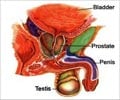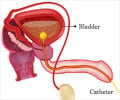Benign Prostatic Hyperplasia (BPH)
Benign Prostatic Hyperplasia (BPH) or Benign Enlargement of Prostate (BEP) is an increase in the size of the prostate. The prostate is a walnut sized gland that is part of the male reproductive system.
Brand Names and Generic Names of Drugs for Treatment of Benign Prostatic Hyperplasia
Abarelix
Abarelix is used to treat prostate cancer for reducing the symptoms and to increase the quality of life in patients.
Abiraterone Acetate
Abiraterone acetate is used along with prednisolone (corticosteroid) for treating a type of prostate cancer called metastatic castration-resistant prostate cancer (mCRPC) previously called hormone-resistant cancer.
Alfuzosin
Alfuzosin is used to treat an enlarged prostate or benign prostatic hyperplasia (BPH) symptoms in men by relaxing the muscles in the prostate and bladder neck and helps to urinate easily.
Brand Names :
Alfuzin | Fual | Xelflo | Alfusin | Efzu Ext | Zofu | Profuzo | Flotral | Alfoo | Dutalfa
More ...
Cyclophosphamide
Cyclophosphamide is an antineoplastic agent, prescribed for many types of cancers like lymphatic cancer, cancer of white blood cells and plasma cells, etc,.
Brand Names :
Oncophos | Cyphos | Cycrame | Oncomide | Ledoxan | Endoxan - Asta | Cycloxan | Cydoxan | Ledoxan | Endoxan - Asta
More ...
Doxazosin
Doxazosin is an alpha blocker, prescribed for high blood pressure and benign prostatic hyperplasia (an enlarged prostate).
Brand Names :
Duraten | Doxapress | Doxacard (1 mg) | Duracard (1mg) | Duraten (2 mg) | Doxapress (2 mg) | Doxacard (2 mg) | Duracard (2 mg) | Doxa | Doxacard (4 mg)
More ...
Dutasteride
Dutasteride is a 5-alpha-reductase inhibitor, prescribed for an enlarged prostate treatment.
Brand Names :
Veltride | Dutride | Sterdu | Duprost | Durize | Dutas (0.5 mg) | Dutalfa | Flodart Plus | Uritin D | Veltam Plus
More ...
Dutasteride And Tamsulosin
Dutasteride And Tamsulosin contains 5 alpha-reductase inhibitor and alpha-blocker, prescribed for benign prostatic hyperplasia (BPH).
Finasteride
Finasteride is a synthetic antiandrogen, prescribed for benign prostatic hyperplasia (BPH), prostate cancer, and hair loss.
Brand Names :
Aga | Astifine | Finabald | Finabald (2.5 mg) | Finabald (5 mg) | Finara | Finara (5 mg) | Finarid | Finast | Finastat
More ...
Naftopidil
Naftopidil is a selective α1-adrenergic receptor antagonist or alpha blocker.
Brand Names :
Naftomax (50mg) | Naftomax (75mg) | Nafodil (50mg) | Nafodil (75mg)
More ...
Prazosin
Prazosin is an alpha-blocker, prescribed for benign prostatic hyperplasia (BPH).
Brand Names :
Cyber - Cr | Prazopress | Prazopress | Minipress Xl | Cyber - Cr | Prazopress - Xl 2.5 | Prazopress | Minipress Xl | Prazocip -1 | Prazopress (1mg)
More ...
Silodosin
Silodosin is an alpha blocker, prescribed to reduce the symptoms of enlarged prostate (benign prostatic hyperplasia) like incomplete emptying of bladder in men and frequent urination.
Brand Names :
Rapilif (4mg) | Silodal (4mg) | Rapilif (8mg) | Silodal (8mg) | Silofast (8mg)
More ...
Tamsulosin
Tamsulosin is an alpha blocker, prescribed for benign prostatic hyperplasia (BPH) or prostate enlargement.
Brand Names :
Veltam (0.2mg) | Prostulin (0.2mg) | Flodart | Urimax 0.4 | Gotam | Uritin | Prostulin (0.4mg) | Veltam (0.4mg) | Tamsin | Ubimax (0.4mg)
More ...
















